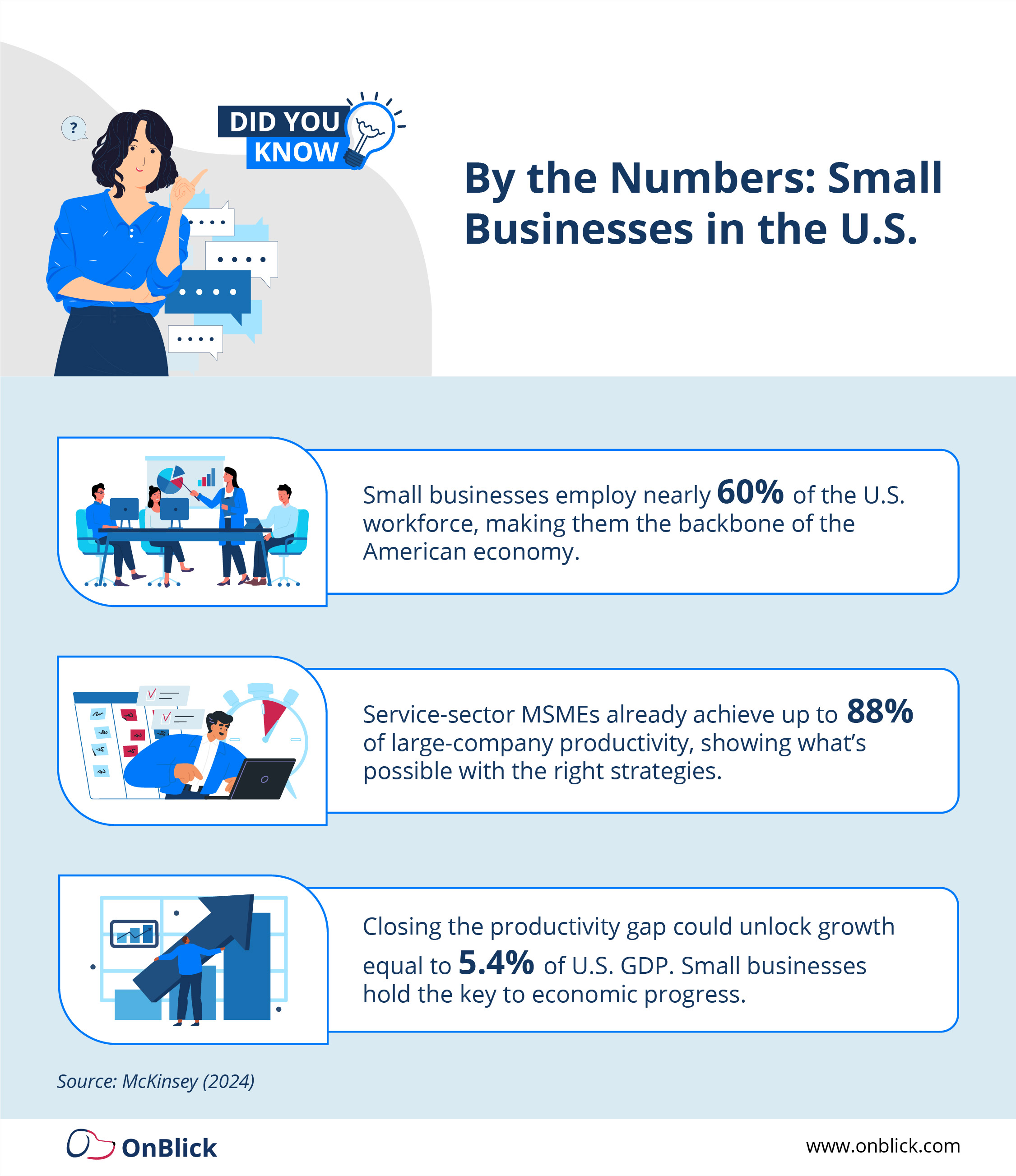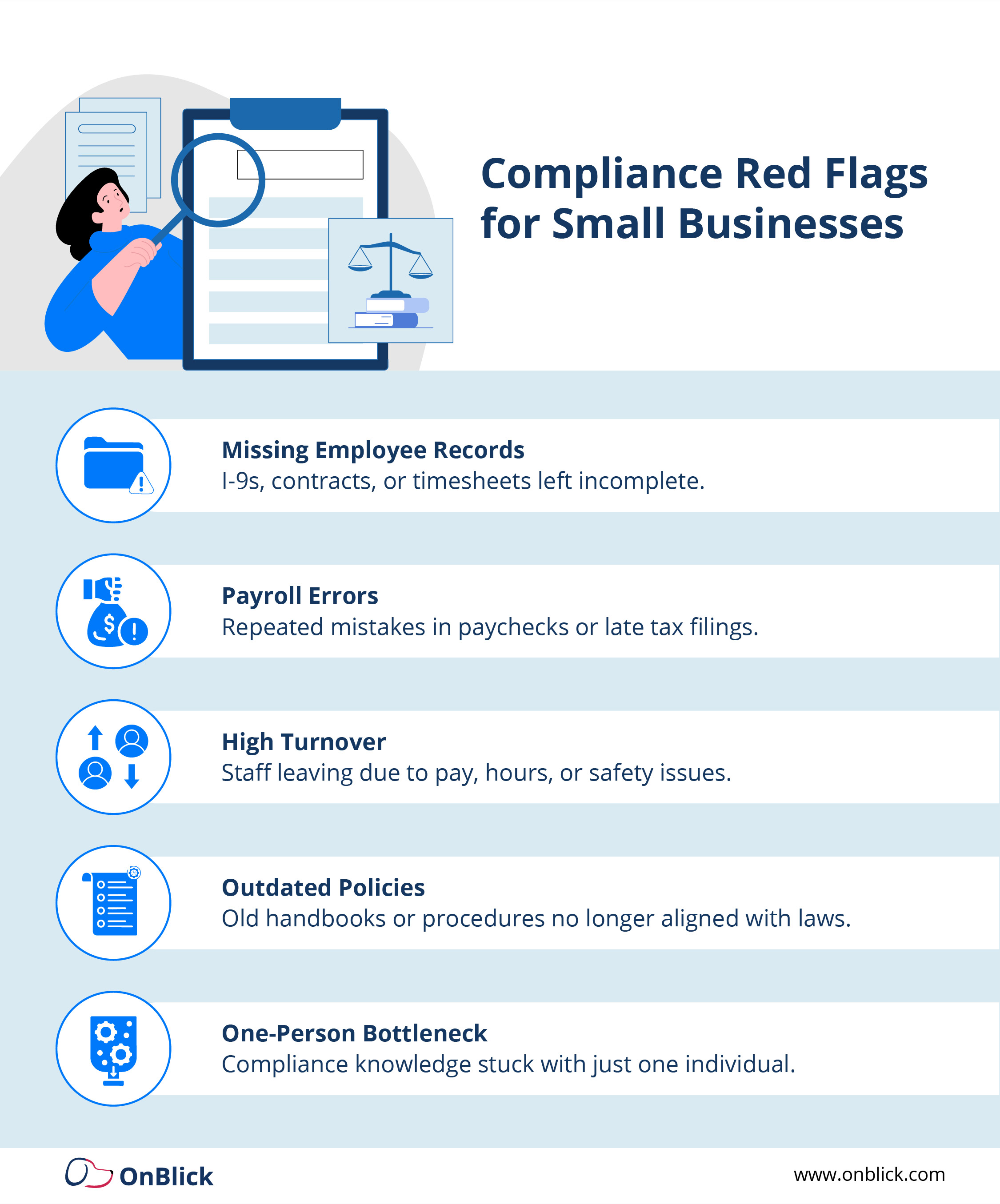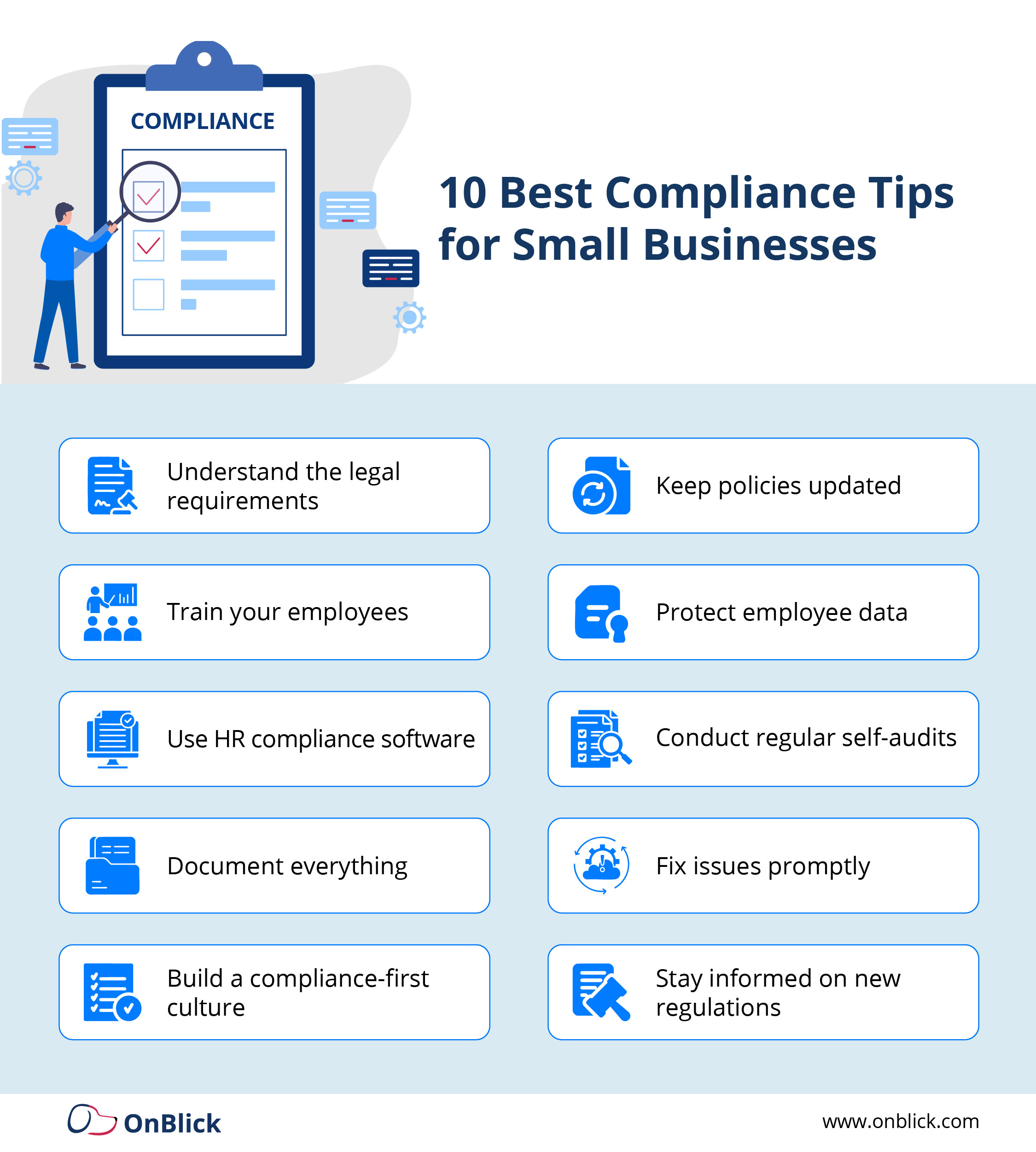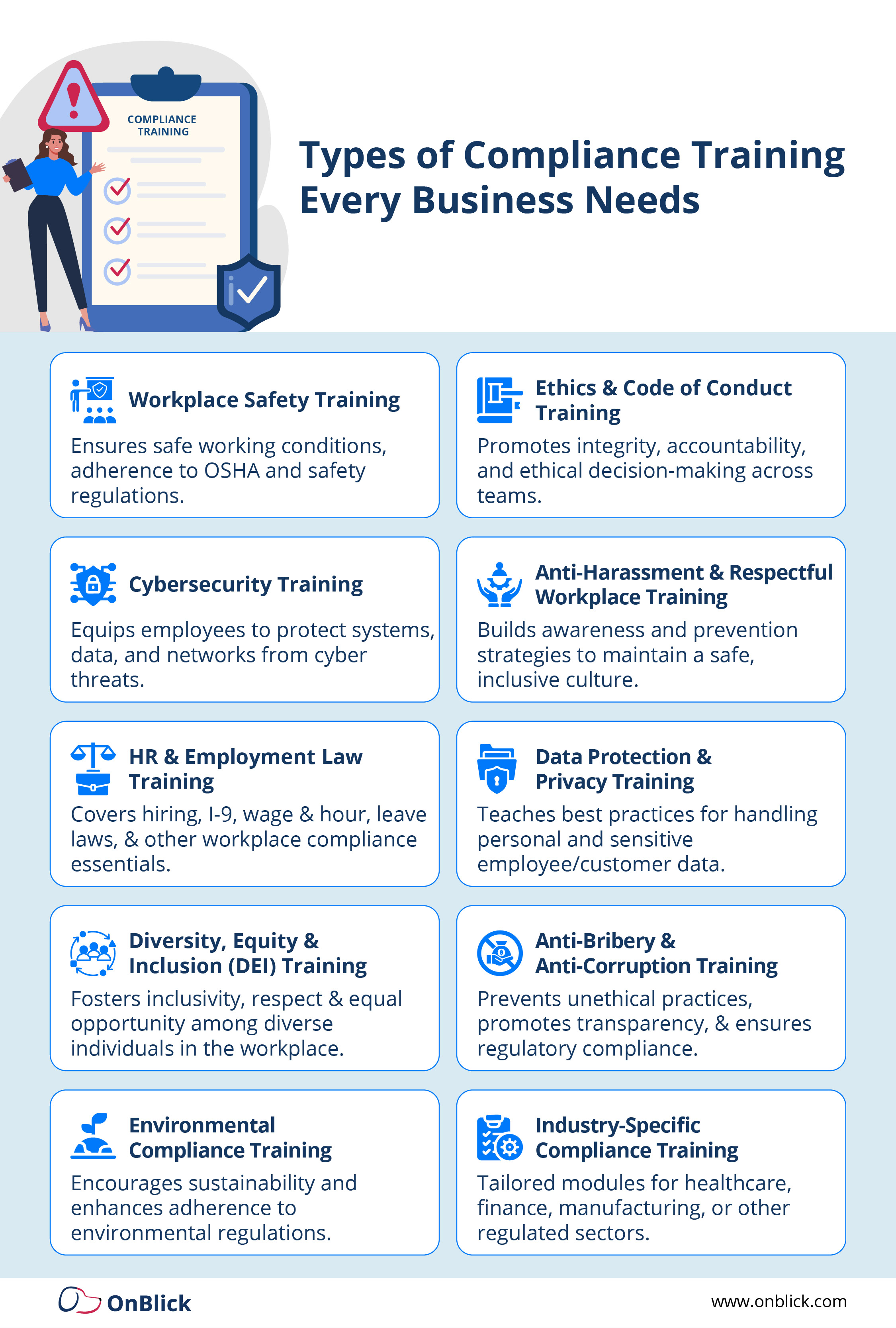Learn More

Compliance is not for big corporations alone. It’s a vital ingredient in the success of every small business. Following rules and regulations can seem overwhelming, but embracing compliance helps build trust with customers, avoid costly penalties, and create a safer, fairer workplace. Prioritizing compliance isn’t just about avoiding fines; it’s about building a trustworthy, sustainable foundation for your business.
This article explores what compliance really means for small businesses, why it matters, and how you can turn it into a driver of trust and long-term success.
When small-business owners hear “compliance,” many think of thick legal handbooks, expensive consultants, or endless government forms. In reality, it is much broader and far more practical than a stack of regulations. At its core, compliance means running your business in alignment with the laws, standards, and ethical expectations that apply to your workforce and operations.
For small businesses, compliance usually touches on three key areas:
A common misconception is that compliance is only for big companies. The truth is that regulators don’t differentiate between a company with 20 employees and one with 2,000 when it comes to labor standards or data privacy breaches. Non-compliance at a small business can lead to fines, lawsuits, reputational damage, or even business closure.
The challenge is to stay proactive: regular audits, updated legal registers, staff training, and proper documentation help ensure that compliance isn’t neglected or misunderstood. As regulations and technologies change, small businesses are wise to seek expert advice and leverage affordable digital tools that simplify compliance management. In the end, successful compliance means protecting interests today and setting a strong course for the future.

Small businesses face several HR compliance pitfalls that can quickly lead to costly consequences if left unchecked.
By understanding and proactively addressing these risks, small businesses can avoid penalties, enhance employee trust, and build a foundation for sustainable growth.

Compliance issues rarely appear overnight; they build gradually through small oversights that eventually create big risks. For small businesses, the challenge is that these warning signs are often subtle, easily overlooked until they escalate into fines, lawsuits, or employee turnover. By learning to spot early red flags, owners can take action before problems spiral.
Here are some of the most common signals that compliance trouble may be brewing:
1. Documentation Gaps: Missing or incomplete employee records, like I-9 forms, wage agreements, or timesheets, are among the top audit triggers. If files are inconsistent or scattered, it’s a clear warning.
2. Payroll Errors: Frequent mistakes in paychecks, delayed tax filings, or repeated corrections aren’t just admin hiccups. They can indicate systemic compliance weaknesses and invite regulatory scrutiny.
3. High Turnover or Employee Complaints: When workers leave abruptly or raise repeated concerns about pay, hours, or safety, it may reflect deeper compliance or HR policy issues that need attention.
4. Outdated Policies: If employee handbooks or safety procedures haven’t been updated in years, your business is likely out of step with current laws. Regulators won’t accept “we didn’t know” as an excuse.
5. One-Person Bottleneck: When only the owner or a single manager knows how compliance is handled, the risk of errors increases, and continuity suffers if that person is unavailable.
Identifying these signs early allows small businesses to act quickly; whether that means updating policies, digitizing documentation, or conducting an internal audit. A proactive approach can turn red flags into opportunities to strengthen systems before they become liabilities.

For small businesses, managing compliance effectively requires a strategic and proactive approach tailored to limited resources and unique challenges. The first step is to develop a clear compliance plan that outlines relevant laws, assigns responsibilities, and sets achievable timelines. This ensures that no critical regulatory area is overlooked and that compliance tasks are integrated into daily operations rather than treated as occasional obligations.
Regular compliance audits and monitoring are essential to identify potential risks early and correct them before they escalate into fines or legal issues. Scheduling routine reviews of policies, training completion, record-keeping, and incident reporting helps maintain transparency and accountability. Staying current with regulatory changes through subscriptions to industry news and active participation in professional groups ensures that the business adapts promptly to evolving requirements.
Utilizing technology and automation tools can dramatically reduce the administrative burden. Compliance management software centralizes documentation, automates reminders for deadlines, and generates audit-ready reports, ensuring accuracy and efficiency. Affordable digital solutions also support policy updates, risk assessments, and employee training management, making compliance easier for businesses with limited staff.
OnBlick is an HR compliance software that simplifies these tasks by centralizing employee onboarding, document management, and immigration compliance all in one intuitive platform.
Equally important is fostering a culture of compliance, where leadership sets a strong example and employees are educated on their roles and responsibilities. Regular training, open communication channels for reporting concerns, and clear consequences for violations create an environment where compliance is embraced, not ignored. For businesses unable to manage compliance internally, outsourcing to specialized professionals or consultants provides expert guidance and peace of mind.
By combining these strategies, small businesses can fulfil complex regulations confidently, avoid costly penalties, and position themselves for sustainable growth.

Policies alone aren’t enough - your team needs the knowledge and confidence to put them into practice. That’s where compliance training comes in. For small businesses, training doesn’t need to be complex or costly; it simply needs to be consistent, practical, and relevant to daily work.
Effective compliance training should cover the basics: workplace safety, anti-harassment, data privacy, payroll accuracy, and employment documentation like Form I-9. These sessions can be delivered in short, digestible formats such as onboarding modules, quarterly refreshers, or even micro-learning videos.
Beyond avoiding fines, compliance training helps build a culture of accountability. Employees who understand their rights and responsibilities are more likely to trust leadership, raise issues early, and protect the business’s reputation. In fact, research shows that companies investing in regular compliance training report lower turnover and fewer incidents of non-compliance.
For small businesses, training is not an extra; it’s insurance against risk and a signal of professionalism. Making it part of the employee experience ensures compliance becomes second nature across the organization.

Small businesses don’t need to invest in expensive, enterprise-grade compliance software to stay on top of their obligations. There are many affordable, scalable compliance tools designed to fit the budgets and needs of smaller organizations. Cloud-based solutions are particularly valuable, offering subscription-based pricing, automatic updates to reflect regulatory changes, and remote accessibility that frees businesses from manual tracking.
Choosing modular software solutions allows small businesses to focus only on essential areas such as policy management, employee training, or audit readiness. This avoids costs tied to unused features. Integration with existing payroll, HR, and accounting systems further streamlines workflows by eliminating duplicate data entries and reducing errors. Many providers offer free trials or starter plans, so small companies can test functionality before committing.
These cost-effective tools often include key features like automated reminders for document renewals, compliance checklists, role-based access control, and easy report generation.
For example, platforms like OnBlick offer comprehensive yet user-friendly solutions tailored to small business compliance needs, helping manage employee documentation, onboarding, and immigration requirements seamlessly and then generating audit-ready reports with minimal effort. Leveraging such tools enables small businesses to maintain compliance efficiently, reduce risks, and focus more on growing their core business.
You can book a free OnBlick demo to learn more about our product and services.

Compliance is a critical foundation for small businesses seeking long-term success, sustainability, and growth. While addressing legal and regulatory requirements can feel overwhelming, prioritizing compliance reduces the risk of costly fines, violations, lawsuits, and reputational damage. More importantly, it builds trust among customers, partners, and regulators while creating a safer and more transparent work environment. Successful HR compliance combines clear policies, ongoing employee training, proactive monitoring, and leveraging technology to streamline workflows and stay audit-ready.